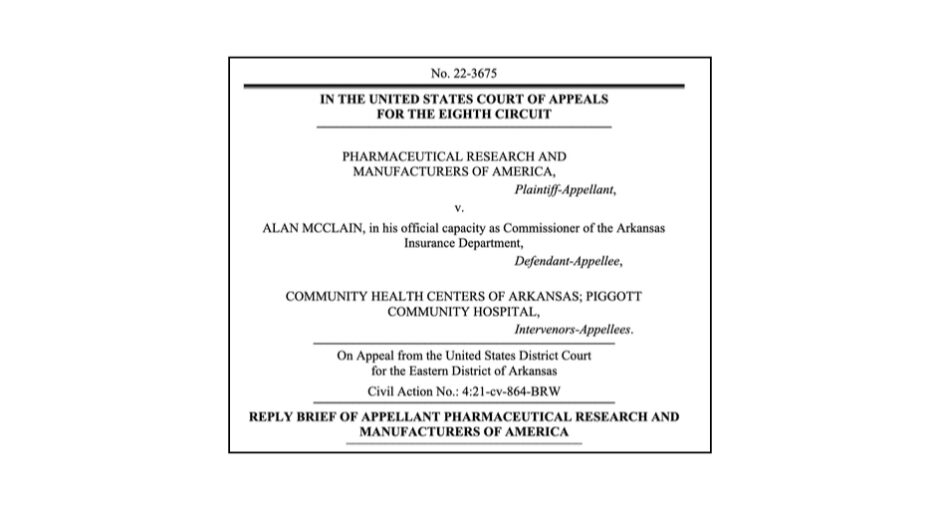Arkansas’ 340B contract pharmacy law, for now the only state law of its kind, has no place in the federal 340B “closed system,” Pharmaceutical Research and Manufacturers of America (PhRMA) recently told a federal appeals court.
“340B is a closed system that is carefully balanced to achieve specific federal aims. State laws like Act 1103 that target and insert themselves into that closed system trespass on the federal field and thus are preempted,” PhRMA argued in a May 16 brief in its lawsuit to have the 2021 law declared unconstitutional.
A federal district court in Little Rock upheld Act 1103 in December 2022. PhRMA quickly appealed to the U.S. Eight Circuit Court of Appeals in St. Louis. All briefs normally required in such an appeal have been filed. Oral arguments have not been scheduled yet.
Act 1103, passed in May 2021, says manufacturers (1) may not prohibit pharmacies from contracting with 340B covered entities by denying access to the drugs they make and (2) may not deny 340B pricing “for an Arkansas-based community pharmacy” that receives 340B-purchased drugs under a 340B contract pharmacy arrangement.
The Louisiana House passed a similar bill in April and it is awaiting final action in the state Senate. Three Connecticut General Assembly committees have passed a broader health care bill filed by the governor with similar 340B contract pharmacy language and it is awaiting a vote in the state House. The CEO of the Community Health Center Association of Connecticut said in an op-ed yesterday, “We have been told that the governor’s office and many legislators are receiving heavy pressure from the pharmaceutical industry to remove the provisions in the proposed bill that protect our patients’ access to 340B price drugs.”
In the appeals court brief, PhRMA blasted Arkansas’ contention that Act 1103, requiring drug manufacturers to honor 340B providers’ agreements with contract pharmacies, deals only with drug distribution, and thus does not conflict with the 340B statute, which the state claimed only governs drug pricing.
“Their artificial distinction does not save Act 1103,” PhRMA told the court. “The 340B statute, in fact, speaks quite clearly to drug distribution by creating a closed system intended to limit the availability of 340B-discounted drugs to a narrow list of specified entities who can only distribute to their patients, capping the burden on manufacturers to prevent adverse collateral consequences to other federal programs.”
The 340B statute further addresses drug distribution by providing that the discounted drugs flow to covered entities through either the manufacturer or via a distribution program of prime vendors, the brief said.
What’s more, the Arkansas law intrudes on the 340B statute’s drug pricing aspect by stipulating who must receive the drug discounts and by imposing its own penalties for failing to provide the discounts to contract pharmacies, PhRMA argued. “The idea that Act 1103 imposes only a delivery requirement divorced from pricing is illogical—after all, Arkansas is not mandating delivery of drugs to contract pharmacies in general, it is requiring manufacturers to provide 340B-discounted drugs to pharmacies,” the filing said.
The industry group reiterated some of its previously asserted arguments, including that the 340B statute is silent on the use of contract pharmacies and that Congress meant the 340B program to be limited in scope so as not to overly burden drug manufactures and disincentivize them from participating in the Medicaid and Medicare programs.
The state and Arkansas 340B covered entities intervening in the case filed briefs on April 10 asking the appeals court to affirm the district court’s December decision upholding the Arkansas law as constitutional and not preempted by the 340B statute or the Food, Drug, and Cosmetic Act.


